The Miracle Fighters (1982)
Directed by: Yuen Woo-Ping
Written by: Peace Group
Starring: Bryan Le, Yuen Cheung-yan, Yuen Shun-Yee, Yuen Yat-cho
AKA KEI MOON DUENV GAP
HONG KONG
AVAILABLE ON BLU-RAY: NOW, from EUREKA ENTERTAINMENT
RUNNING TIME: 99 mins
REVIEWED BY: Dr Lenera
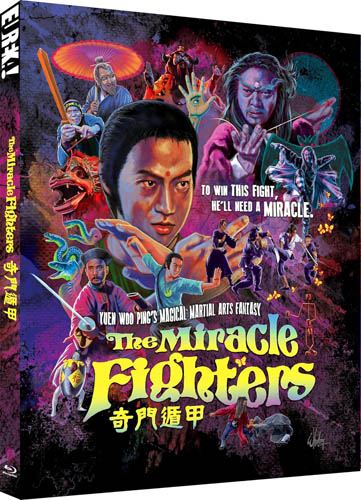
During the Qing dynasty, marriage between Manchu and Han people is outlawed. When it’s discovered that high-ranking official Kao Hsung has taken a Han wife, the Emperor informs him that he’ll be forgiven – but only if he kills his wife before the court. When he refuses, Kao is marked for death by the powerful Sorcerer Bat and forced to watch as his wife is slain before his eyes. He flees, kidnapping the Crown Prince during his escape, but accidently kills him and is forced to silently replace him with another young boy. In adulthood, that innocent child – Shu Kan – finds himself targeted by Sorcerer Bat, while Kao has become an alcoholic, but maybe two local Taoist priests can help out – if they can stop quarreling with each other for more than a moment….
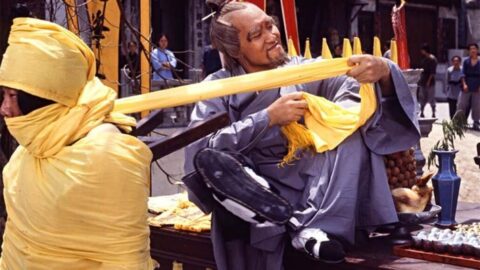
For some reason I ‘d thought I’d already seen The Miracle Fighters, but I must have confused it with another film. What film that was I can’t work out, but if it was as bonkers as this one I seriously doubt. It’s in the same vein as other Hong Kong meldings of action, comedy and the supernatural of the time, the most popular being Encounters Of The Spooky Kind, The Dead And The Deadly and Mr Vampire, but legendary director and action choreographer Yuen Woo-Ping, in the position of almost being able to do what he wanted thanks to the big commercial success of the likes of Snake in the Eagle’s Shadow, Drunken Master, Magnificent Butcher and Dreadnaught, to the point of setting up his own production company with his four brothers Yuen Cheung Yan, Yuen Shun-Yi, Yuen Yat-Chor and Brandy Yuen. obviously decided to go even crazier with the format which had already allowed for all sorts of inventive insanity, which for many of us Hong Kong fans, was highly contributory in converting us to the cause back in the day. This particular movie is an almost nonstop series of comical magical duels and displays of wizardry, and I could probably spend much of this review just saying that THIS happened and THIS happened, rather than going through part of the plot and critiquing, because it’s easy to lose focus on the story, which, while moving along familiar lines does try to add some cool touches, frequently stops so that we can have even more comical magical duels and displays of wizardry, in a film where one variant on the same situation is rarely considered to be enough, but the energy and invention levels are so high that we don’t mind at all. Likewise the amount of actual martial arts is relatively low, but then the emphasis isn’t on that, and the Woo-Ping brand of wirework is truly perfected here in the stuff that we do get.
It all seems rather serious at first. We’re in 1663, and Kao, the Emperor’s martial arts trainer, is kneeling before his boss who reminds him that Qing dynasty law prohibits Manchus and Han from marrying, and that “violators will be beheaded“. Someone informed on Kao that he’d taken a Han wife, and now he’s in big trouble, though he’ll be spared if he beheads his wife instead. It’s all very intense, especially when the wife is slashed to death anyway and we linger on her death throes. Guards attack Kao in a scene which misleadingly lets the viewer think that this will be a martial arts film first and foremost, before Kao then has to fight Sorcerer Bat the palace’s wizard – and then things suddenly get weird. Bat turns into – though this won’t make sense later on when they seem to be different beings – a large jar which keeps rolling towards Kao before a white-faced kid, I guess a ghost, is revealed to be inside who produces then swallows a piece of paper containing “Imperial Order 111”, then produces a paper sword with which he carries on the fight. Sometimes his head, arms and legs disappear inside the jar, sometimes he spins for ages on the floor. It’s rather a shame when the bizarreness goes when more men turn up to take over the fight. Kao is able to escape by taking the Emperor’s young son hostage but he squeezes him too tightly and suffocates him, in another rather dark moment. Bat is ordered to hunt Kao down, then we move forward two years to meet our two childish magicians, who are a bit like the masters in Mr Vampire 4, arguing over who first puts incense sticks on an altar. What’s notable is the photograph on the altar. It’s of Simon Yuen aka Beggar So, the recently deceased father of the Yuen brothers. Rice wine is poured into the mouth on the photograph, the mouth and the eyes move, and the colour returns to his face, which is both funny and a bit poignant.
Things become a bit incoherent already when Kei-Moon and Tun-Kap’s magical one-upmanship somehow turns into Kei-Moon seeing another guy scamming people and trying to make it rain, whereupon we have a brief fight on the street in front of loads of people, before he turns his umbrella into a cloth with a diagram on it which has the sun in the middle, though it’s wrapping the other guy in a yellow scarf which more seems to cause clouds to form and wind and rain to result – whereupon the poor street magician comes to the first of several slightly grisly but comical deaths. Now we rejoin Kao, who’s living in a shack with a teenager, which reveals one mighty big mistake in the script. We soon learn that Kao found him as an infant under a tree, adopted him, called him Shu-Kan which is literally translated as “Tree Root”, and, to cover up what he’s done, put the prince’s jade on him. So now, seeing as Shu-Kan is a young adult, we’re actually around a decade further on, not just two years! Kao is angry at Shu-Kan, who wants to learn more Kung Fu from him, for not getting jim enough wine, then falls out of a teahouse to be knocked over by a carriage. Some of Bat’s men find them at home and notice the medallion. In the ensuring fight Kao is blinded and Shu-Kan goes to find medicine, encountering both Kei-Moon and Tun-Kap. The two both begin to teach him, but can’t seem to make peace with each other, which is surely necessary when Bat shows up and uses his black magic to put the birth marks of the prince on his foot, in order to return him to the Court and get promoted, so that he may take over the world – though surely, being so powerful, he could just kill every one in the court and take the place over? In fact the plot seems to forget Bat’s ambitions, but then what’s happening on screen before our startled, “did I just see that”? eyes is more important, surely?
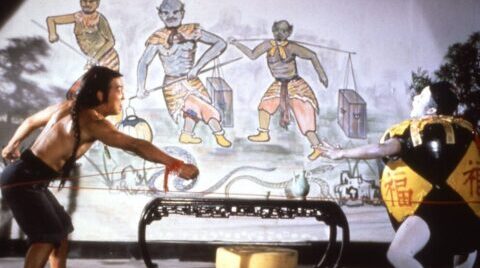
There’s a great combining of spookiness and chuckles fairly early on when Shu-Kan enters the houses of both magicians. He sees a painting of a waterfall which causes him to yearn for some water to freshen him up, whereupon the waterfall actually showers him, after which an apparition with extremely long arms hands him a towel to dry himself. Writing appears to welcome him and ask him where he’s going, a cooked chicken flies around, and paper strips form noodles. As the story seems increasingly like an excuse for all the characters to have magical encounters with each other so we can witness weird shit, the law of diminishing returns threatens slightly, so simple slapstick is sometimes employed. At one point Kao is being pulled by both of his teachers in different directions in speeded up photography, which did make me laugh. The idea of them both constantly being at odds is overdone, though there’s some cool training stuff. Matters really revive and reach edifying levels of absurdity in the final reel, which features a competition for the Five Thunder Heavenly Master Orders. It begins with lots of people running after a stuffed rabbit propelled by a firework, and somebody’s fish telling someone that he’ll die for him, then dying. Throughout, we’ve had short bursts of fighting, beginning with Eddie Ko battling Yuen Shun-Ye, usually featuring swords which Bryan Leung shows much expertise at while battling several soldiers in the second fight scene, which are well done but make one wish they’d lasts a bit longer. But the end we’re rewarded with a climatic duel between Yuen Yat-Chor and Shun-Ye, where the melding of wizardry, Kung Fu and comedy truly comes together in a grand way, Bat trying to pin down Kao’s shadow with his soul-catching knives being only one of a dozen great touches in this terrific finale. A little fight with ropes a bit earlier is also highly memorable – and let’s not forget the bit when Shu-kan is shrunk so that he’s just legs, arms and a head. Of course in this film many of the wires are intended to be visible.
A tiny drill to the head is one of several somewhat violent deaths in a mostly comic film, which makes the ‘PG’ rating rather surprising seeing how strict the BBFC have become at the lower end of the rating scale, though I’d say that it was still fine at ‘PG’ anyway. While there is a gag involved urine – even though said urine looks like water – there isn’t any sex-related humour in this one, a film who’s only major female character is an elderly magician played by a man. The ending to another display of that exquisite method of killing shown in You Only Live Twice is another surprise in a film that contains quite a few surprises, which is certainly a good thing even if we feel that the last surprise isn’t necessary – but then again we had to have a feelgood ending. Unfortunately we don’t feel enough of the relationship between Kao and Shu-Kan, which feels like it could have done with an extra scene or two, while Yat-Chor’s lack of charisma doesn’t help. But then again the emotional centre is really our two magicians who just won’t grow up; we end up really caring about their bond despite there being, in typical Hong Kong movie style, little attempt to make Bryan Leung look like an old man, and Leung perhaps overdoing the hamming. Shun-Ye’s Bat, who hadn’t long done similar honours in Woo-Ping’s Dreadnaught, is a memorably theatrical villain who at one point utters the line “I came here to borrow your head as a stepping stone for my promotion”, which should by rights be well known, though I suppose it doesn’t help that the English dub changes it to the rather less memorable “I’ve come for your head and I’ll get promoted for that”. The guy who plays the female Tun-kap, Yuen Cheung-Yan, does a rather fine job mimicking feminine movements and expressions. As director, Woo-Ping keeps the pace going, even if a few gags could have done with being cut down a bit.
The music score by Tang Siu-lam leans on the comedy but finds room to incorporate two short passages from John William’s Raiders Of The Lost Ark and just one seven-note passage from Max Steiner’s score to the original King Kong – yes, just one seven-note passage, but easily identifiable. The Miracle Fighters occasionally stumbles a bit but is still another hugely fun enterprise, and one which kids will probably enjoy as much as – or even more than – adults. It spawned two follow-ups which sound just as crazy. Eureka – please!
Rating: 









SPECIAL FEATURES
Limited edition O-Card slipcase featuring new artwork by Darren Wheeling [2000 copies]
1080p HD presentation on Blu-ray of the original Hong Kong theatrical cut from a brand new 2K restoration
This immensely colourful film almost serves as a showcase for the Blu-ray format, with very rich hues and a picture which is sharper than we’ve seen from Eureka’s Hong Kong releases in some time, though most certainly not unnatural-looking; no digital sharpening in evidence.
Original Cantonese mono audio and optional classic English dub
Optional English subtitles, newly translated for this release
Brand new audio commentary on the Hong Kong theatrical version by Asian film expert Frank Djeng (NY Asian Film Festival)
Djeng does solo duties here and is a bit more laidback than normal, not talking so much at top speed so he can get as much information out there for us, and taking a few notable breaks in the second half, but think of the number of these that Djeng does; it’s a wonder he doesn’t sound totally exhausted, nor repeat himself more than he actually does – which isn’t often! As usual, he explains details that western viewers would miss or not understand, such as characters talking like modern people, the term “broken day” meaning a “bad omen” day, and that most of the rituals are made up though the rain ceremony is real. There’s not much information about the actual film, a film which hasn’t been seen much on video and DVD [perhaps due to rights issues?] but Djeng manages to point out a lot of stuff and be reasonably scene specific.
Brand new audio commentary by action cinema experts Mike Leeder and Arne Venema
Leeder and Venema are enjoying themselves so much doing this track that sometimes one of them is just laughing for a while. Leeder, who later mkes us jealous when he tells of going out on the piss with Sammo Hung and Eric Tsang, opens by saying that the “the reason that nobody took acid in Hong Kong after 1982 is that Yuen Woo–Ping took all of it”. Well, you can’t say that it’s not appropriate for the film in question. Leeder’s story about Rza, during the making of The Man With The Iron Fist, telling Lau Gar Leung that he took up martial arts because of him and Lau replying “but I don’t know martial arts” is truly priceless, as is Woo-Ping swinging a Nunchuku and hitting himself on the set of Yip Man 4, then saying “don’t tell anyone”. Meanwhile Venema thinks things were more planned out than usual on this production, says how he recently nearly cut off part of a finger with a knife, huis clumsiness with blades being why he doesn’t do weapons fighting, and joins Leeder in a fascinating chat about stuntpeople. One of their classic tracks!
.Action Master: An Interview with Yuen Woo-ping – archival interview by Frédéric Ambroisine [21 mins]
This interview, in Cantonese, seems to have certainly caught Woo-Ping in a good mood as he’s frequently smiling and answering the questions being put to him in detail – though I gather that he’s usually like this. He describes some of the stars he worked with, says that Yuen Baio “lacked power in his legs”, that Donnie Yen’s notorious breakdancing scene in Tiger Cage came about because he asked Yen if there was anything else he could do, and doesn’t miss the way older films were made, thinking that things have improved; I’m not sure that I agree with that, of course.
At the Service of the Great Magician: An Interview with Fish Fong – interview with assistant director Fish Fong [17 mins]
For me, this was actually the most interesting of the three interviews gathered here. Fong, a director of TV advertisements in-between working with Woo-Ping, tells of a fair bit about the production of The Miracle Fighters, including the original concept being set in Tibet about reincarnation, there being no available actresses of the right age for Tun-kap which is why they went for a man to play the part, and that there were over 20 000 snakes on set and many of them were killed by the dry ice used as fog which prevented them from breathing.
The Shakespeare of Yuen Woo-ping: An Interview with John Kreng [16 mins]
Quite obviously from one of the Matrix DVDs, this begins amusingly with stunt coordinator and fight choreographer Kreng coming out of a room with Woo-Ping to encounter Laurence Fishbourne saying “I knew you guys were talking about me, that I’m hard to train”. He tells us a bit more about Woo-Ping the man, the 2017 remake which I just have to see, and that one of several particular qualities of a Woo-Ping fight is that you learn about the characters while they’re fighting.
Reversible sleeve featuring original poster artwork
Stills Gallery
Trailer
A limited edition collector’s booklet featuring new writing on the film by James Oliver [2000 copies]
A viable alternative to taking psychedelic substances, “The Miracle Fighters” is classic era Hong Kong cinema at its most bonkers, and Eureka unsurprisingly do it justice. Highly Recommended


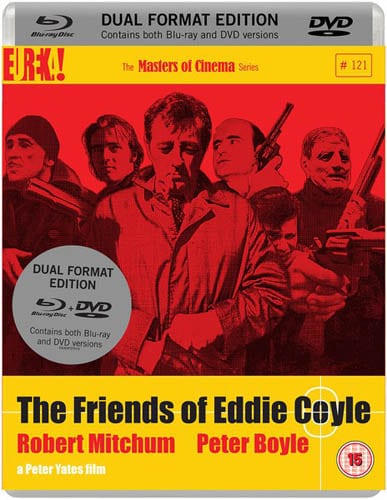
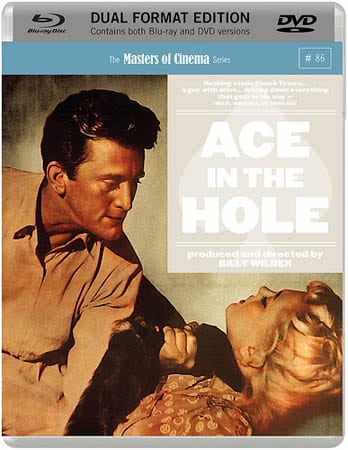
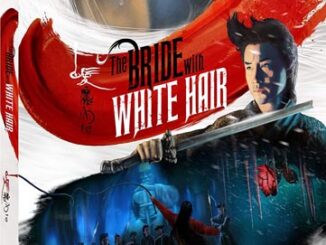
Be the first to comment